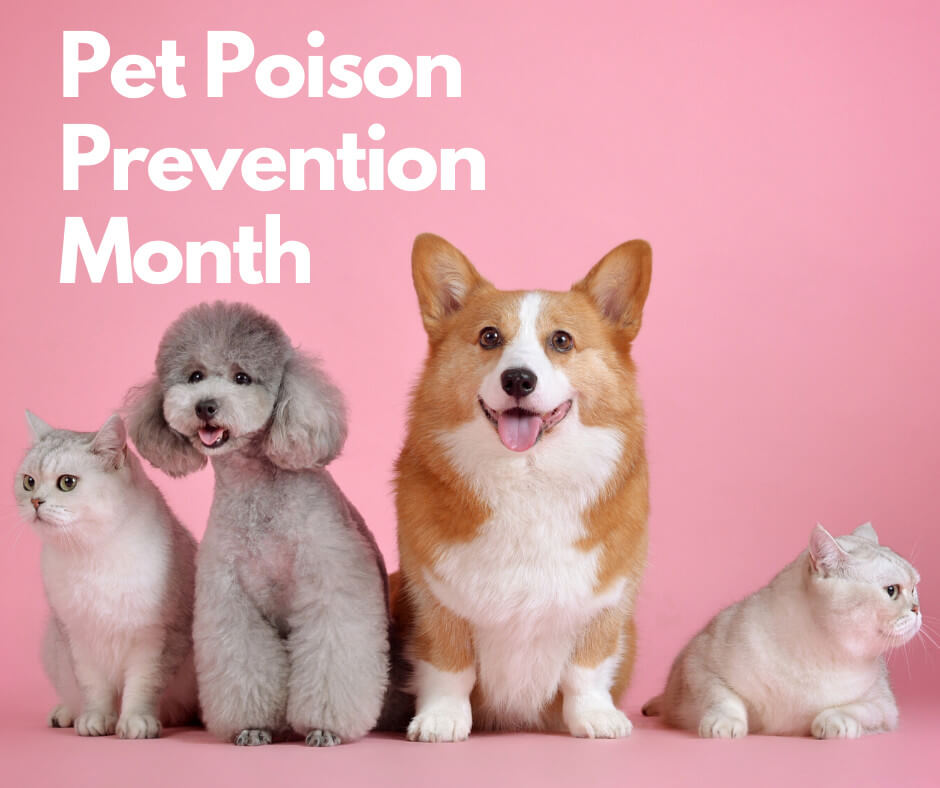5 Useful Tips From Experts In Pet Poison Prevention
By : Rita Stadler
March is Pet Poison Prevention Month. Pet safety is important all year long, but we’re spending a little more time on it this month. Our pets are a part of our family, and our homes are their homes, too. Sadly, some common household products are dangerous to pets and often overlooked by people, their protectors. Find out what items in your house could endanger your pet, what the signs and symptoms of pet poisoning are, and what alternatives could reduce the risk.
What are the most common pet poisons?
According to the Pet Poison Helpline, the most common toxins they get called about differ between cats and dogs. Although some of these are more toxic than others, these household items result in the most calls for help.
Top 10 Dog Poisons:
|
Top 10 Cat Poisons:
|
Keep in mind that even if your pet doesn’t ingest rodenticides directly, they may still experience secondhand poisoning by eating a rodent that has ingested poison.
Keep your home pest free with simple, effective solutions. Subscribe and save!
What are the signs and symptoms of pet poisoning?
Pets can experience a wide range of symptoms depending on the type of poisoning that has occurred. Some of the most common symptoms are gastrointestinal- nausea, vomiting, and diarrhea. However, there other signs to look out for such as:
- Weakness/ lethargy
- Extreme thirst or urination
- Increase in drooling
- Jaundice (yellowing of the gums, eyes, etc.)
- Loss of appetite
- Racing heart rate
- Convulsions
- Burns on mouth and tongue from chemicals
This list isn’t exhaustive, so it is best to use your best judgment. If your pet is behaving abnormally, it is always a good idea to have them checked by a vet. If you know that your pet has been poisoned, it is best to remain calm and act quickly. Contact your vet immediately. You can take the poisonous substance with you or verbally tell the vet. Knowing what poisoned your pet will help you get the best and quickest treatment. If you don’t know what poisoned them, don’t panic! If your pet is vomiting, take a sample of it with you to the vet. They will be able to run tests to identify the problem. If you don’t have access to a vet, do not induce vomiting! This can cause more harm than good. It is best to call a hotline like the ASPCA Animal Poison Control Center at (888) 426-4435. The professionals will be able to guide you in your next steps.
5 Tips to Prevent Pet Poisoning
Most experts will agree that as a general rule, anything that you would keep out of reach for a child, you should also keep out of reach for a pet. Here are 5 tips from the experts to prevent poisoning:
- Store all chemicals and cleaners in areas that are inaccessible to pets. Place dangerous products that are high, hard to reach spaces. If you store them in cabinets, add child-locks as a safeguard.
- Store rodenticides in metal cabinets or where pets can’t find them. Be very cautious when using rodenticides in the home and garden. According to ASPCA, it is also a good idea to notify neighbors so that they can monitor their pets, too. Because pets can be in danger from handling a poisoned rat, it is best to limit the use of mouse poisons. If you are looking for a safer alternative, check out rodent repellents such as Stay Away® Rodent to keep pests away.
- Lock up any medications. Many human drugs have adverse effects on our pets. Animals metabolize medicine differently from humans, so it is best to place them in locked cabinets. A pro tip is to store human and pet medicines separately to prevent accidental dosing of the wrong prescription.
- Steer away from human foods. While certain human foods are okay, experts recommend playing it safe by sticking to foods made strictly for animals. If you want to feed human food to your pet and are unsure, be sure to check with your vet or lists like the one listed on the AKC website. If you follow information from the internet, make sure it is a reputable source that you can trust.
- Be aware. Continue to educate yourself on dangerous products and items. Become familiar with what is toxic to your pet and be prepared in the event of an emergency.








 day
day